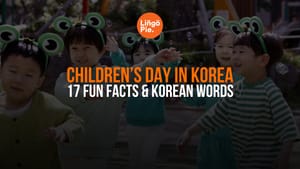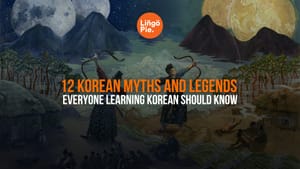Ever found yourself picking up phrases from your favorite TV shows? That natural absorption is exactly why watching shows in a foreign language works so well for learning. Even for Korean, which language experts classify as a Category 4 "exceptionally difficult" language, Netflix binge-watching can fast-track your progress while keeping things fun.
If you're just starting with Korean, you're in luck! Netflix has become a huuuge library of Korean movies and dramas offering the perfect mix of clear speech, everyday vocabulary, and storylines you can't stop watching. In this guide, I'll share 11+ outstanding Korean shows that are beginner-friendly and genuinely entertaining. More importantly, my picks are geared for all the Korean language learners out there!
- Best Way To Learn Korean: A Guide For Beginners
- Konglish: 30+ Korean Loanwords You Never Knew Existed
- 6 Best FREE Korean Learning Websites For Beginners

Best Korean Dramas on Netflix
Learning Korean through Netflix shows gives you natural, everyday language that textbooks often miss. You'll hear authentic pronunciation, slang, and cultural expressions while getting hooked on engaging storylines. Plus, with subtitles in English (or both!), you can follow along even as a complete beginner and gradually build your comprehension skills.
1. Crash Landing on You

This romantic drama follows a South Korean heiress who accidentally paraglides into North Korea and meets a military officer who decides to help her hide. Their unlikely romance blossoms as he works to secretly get her back home, navigating dangerous political tensions and cultural differences along the way. The series became a global phenomenon for its blend of romance, comedy, and geopolitical intrigue.
For language learners, Crash Landing on You offers a unique opportunity to hear both South and North Korean dialects, showcasing the differences in accent and vocabulary. The dialogue alternates between formal military speech, casual conversation, and romantic exchanges, giving beginners exposure to various speaking contexts.
2. Itaewon Class

After serving time in prison for a crime he didn't commit, Park Sae-ro-yi opens a bar-restaurant in Seoul's vibrant Itaewon district to fulfill his dream and get revenge on the powerful family that ruined his life. Along the way, he assembles a team of misfits who become like family while standing up against discrimination and corporate corruption.
The language learning value of Itaewon Class comes from its wide variety of urban speaking styles and vocabulary. Throughout the series, you'll be exposed to business terminology, street slang, and emotional expressions that you can actually use in real life. Given that the characters are from different social standings, learners will hear various speech patterns, accents, and formality levels.
3. It's Okay Not to Be Okay

A children's book author with antisocial personality disorder meets a psychiatric hospital worker who's devoted to his autistic brother. Their unusual romance helps all three heal from childhood trauma, with stunning visuals and dark fairy tales woven into the story.
Language learners will love this show because the female lead speaks incredibly clear, formal Korean that's easy to follow. Her precise way of speaking contrasts with other characters' more casual styles. The hospital setting teaches you medical and emotional words, while the fairy tale segments use simpler storytelling language that's perfect for beginners.
4. The Glory

After suffering brutal bullying in high school, a woman spends years meticulously planning her revenge against the perpetrators and those who looked away. Now working as a teacher to her main tormentor's child, she sets in motion an elaborate scheme to make each bully face the consequences of their cruelty while exposing the corruption that protected them.
This intense drama offers valuable language lessons through its range of speaking contexts. The protagonist's carefully controlled speech during her teaching job contrasts sharply with emotional confrontations when facing her former bullies. Through these scenes, you'll learn how Korean changes with emotional intensity and social position.
5. Queen of Tears

A chaebol heiress running a luxury department store and her husband from a humble rural background find their cold marriage at a breaking point after three years together. When she receives a terminal diagnosis, however, everything changes as they slowly rediscover their love while facing business conspiracies and family opposition that threaten to tear them apart again.
For language learners, this drama brilliantly showcases the contrast between sophisticated Seoul business speech and warm countryside dialect. Through office meetings, you'll absorb formal business Korean with proper honorifics, while family scenes demonstrate how affection softens language and changes speaking patterns. As the couple's relationship transforms, you'll also pick up romantic expressions and terms of endearment that show how intimacy shapes Korean conversation.
6. Hometown Cha-Cha-Cha

When a perfectionist dentist loses her Seoul clinic after a dispute, she relocates to a charming seaside village where she meets the mysterious town handyman who seems to help everyone. Despite their opposite personalities they gradually fall for each other against a backdrop of scenic ocean views and endearing community relationships.
Serious about learning basic expressions? Then this Korean show is perfetc for you! As you follow along, you'll absorb everyday vocabulary about food, community activities, and relationships while the slow-building romance gives you time to connect words with emotional context—ideal for beginners who need repetition.
7. Business Proposal

In a case of mistaken identity, a woman agrees to go on a blind date in her friend's place, planning to scare off the suitor—only to discover he's actually her company's CEO. When he proposes a fake relationship for business reasons, they enter a contract that gradually evolves into real feelings as they navigate workplace complications and family expectations.
This rom-com excels at teaching modern dating terminology and relationship progression vocabulary through its fake dating premise. You'll pick up phone conversation etiquette, texting abbreviations seen on screen, and social media language as the characters communicate across platforms.
8. Extraordinary Attorney Woo

A brilliant lawyer with autism navigates complex cases at a prestigious law firm using her exceptional memory and unique perspective on legal problems. Despite struggling with social situations and facing prejudice, she finds allies who appreciate her abilities and help her grow both professionally and personally through challenging cases and unexpected friendships.
This series offers unparalleled access to Korean legal terminology and courtroom language through cases explained in exceptionally clear, precise Korean. The protagonist's special interest in whales introduces marine biology vocabulary, while her literal interpretations of idioms provide natural explanations of figurative expressions.
9. Squid Game

Desperate individuals drowning in debt accept a mysterious invitation to compete in children's games for an enormous cash prize. Their initial excitement turns to horror when they discover elimination means death, forcing the main character to form strategic alliances while confronting brutal ethical dilemmas about survival, humanity, and society's inequalities.
For language learners, this global hit delivers childhood game terminology and nostalgic expressions rarely covered in textbooks. The competition structure teaches numbers, counting patterns, and time expressions through game rules and deadlines. The diverse contestants represent different social classes and regions, exposing learners to variations in speech patterns, accents, and socioeconomic indicators in language.
10. Kingdom

Set in Korea's historical Joseon period, the Crown Prince investigates a mysterious plague that resurrects the dead as flesh-eating monsters. While fighting the zombie outbreak, he uncovers political conspiracies against the throne and witnesses how the crisis affects people across all social classes, from nobles to peasants struggling to survive.
This historical thriller provides rare exposure to traditional Korean with authentic period vocabulary, archaic expressions, and historical titles that reveal the roots of modern honorifics. While the expressions are definitely dated, this is a good resource if you want to learn the cultural side of the language.
11. Hospital Playlist

Five doctors who've been friends since medical school reunite at the same hospital while nurturing their shared passion for music by forming a band. Each episode weaves together their professional challenges, personal relationships, and musical performances, creating a warm portrayal of friendship, healing, and growth amid the pressures of hospital life.
This beloved series excels at teaching specialized medical terminology across different departments from surgery to pediatrics. The music subplot introduces instrument names, performance vocabulary, and practice-related expressions that language courses rarely cover.
12. The King: Eternal Monarch

An emperor from a modern Korea where monarchy still exists discovers a portal to our Korea, a democratic republic. There he meets a tough detective and falls in love while uncovering a villain's plot to control both parallel worlds. Their relationship develops across dimensions as they navigate alternate versions of themselves and the people around them.
Language students benefit from this fantasy drama's contrast between royal protocol language and modern democratic speech patterns. The parallel universes premise naturally creates comparing and contrasting expressions as characters explain differences between worlds. There are also some physics-related discussions that introduce scientific terminology and theoretical concepts in accessible Korean.
13. Vincenzo

A Korean-born Italian mafia consigliere returns to Korea after being betrayed by his organization. Planning to recover hidden gold beneath an apartment building, he instead finds himself defending the building's quirky residents against a corrupt corporation. His ruthless tactics and legal expertise gradually transform him from cold-blooded avenger to reluctant hero as he falls for a fearless lawyer.
This action-comedy uniquely demonstrates how Korean incorporates foreign expressions, with Italian phrases naturally integrated into dialogue. The international protagonist reveals how Korean identity is expressed linguistically when someone returns from abroad. The mafia background in this show also provides exposure to underworld slang and coded threat language rarely taught in formal settings.
14. Parasyte: The Grey

When alien parasites arrive on Earth and begin taking over human hosts by fusing with their brains, a young woman becomes a rare case of balanced coexistence with her parasite, named Grey. Neither fully human nor fully parasitic, she navigates her new identity while being hunted by government forces and a mysterious cult with its own agenda for the invasion.
This sci-fi thriller teaches body vocabulary through detailed descriptions of physiological changes during parasitic infection. Identity crisis scenes introduce philosophical terminology and existential questions expressed in accessible Korean. The cult storyline showcases religious and spiritual terminology alongside persuasion techniques, while action sequences feature clear directional language and spatial orientation expressions vital for understanding dynamic situations.
- 5 K-Dramas Like When Life Gives You Tangerines
- 6 Romantic Korean Movies To Watch With Your Oppa
- 6 Best Korean Reality Shows On Netflix Worth Losing Sleep Over
How To Learn Korean With Netflix
Netflix offers an entertaining pathway to Korean fluency, but you'll need a strategic approach to transform casual watching into effective learning. The key is active engagement! For this. you need to create a structured routine where you watch with Korean subtitles, pause to practice pronunciation, and keep track of new words and phrases.
- Start with dual subtitles - Use English subtitles first, then switch to Korean once you're familiar with the plot
- Create a vocabulary journal - Note down useful phrases and review them between episodes
- Use the 10-minute method - Rewatch the same 10-minute segment multiple times until comprehension improves
- Practice shadowing - Pause and repeat lines after characters to improve pronunciation and rhythm
- Join Korean learning communities - Discuss favorite shows with other learners to enhance retention
To supercharge your Netflix language learning, try the Lingopie Extension. This browser extension is part of the Lingopie subscription that allows you to watch Netflix shows and actually learn from them. Some of its notable features include instant translations, customizable dual subtitles, and one-click saving of words and phrases to your personal vocabulary list.
Unlike standard Netflix, Lingopie lets you click any word to see its meaning, pronunciation, and grammatical role, turning every K-drama into a personalized Korean lesson that adapts to your learning level.
Ready To Watch And Learn Korean?
And that's a wrap on your ultimate guide to the best k-dramas available on Netflix! Now you know why learning Korean with TV shows works so well and you have a list of fantastic picks to get the ball rolling on your learning journey.
Take this natural learning approach to the next level with Lingopie. With its highly addictive and immersive features, it's impossible to say that you won't learn Korean after a few episodes! Give it a try now!
FAQs: Learning Korean with Korean Dramas
Which Netflix shows will teach me about the culture in South Korea?
All of the above-listed shows will teach you about elements of Korean society and culture. They are a window into societal norms and values, traditions, customs, cuisine, and more. If you want to dive into south Korean culture, you can watch the Seoul, South Korea episode of Street Food: Asia on Netflix.
What are the main benefits of learning Korean with TV?
Learning Korean with TV has many benefits, but crucially it is a more fun and engaging way to learn than studying textbooks. You can naturally pick up grammar, sentence structure, Korean verbs, and other crucial language building blocks while you're enjoying the show. This is language acquisition at its most natural, and it mirrors how babies learn their mother tongue.
What is the best Sci-fi drama to learn Korean on Netflix?
The Silent Sea, starring Bae Doona and Gong Yoo, is a space exploration series in which a team undertakes a mission to retrieve samples from a destroyed research facility. The story takes place in the near future, in which the Earth is suffering desertification and the astronauts are trying to find alternate sources of potable water. In The Silent Sea, classified secrets and terrifying realities bubble to the surface.
This is a great pick for learners as it is gripping and thrilling, so you can learn without even feeling like you are studying.
Why did Kim Hye Soo and Kim Woo Bin both return to TV?
Korea boasts many brilliant dramas and an incredible selection of top-quality TV actors, Kim Hye Soo and Kim Woo Bin included.
Kim Hye Soo returned to TV after many successes in films, as k-dramas are very popular and profitable at the moment.
Kim Woo Bin had to take some years out of his career as he was diagnosed with cancer. Both actors are back on our screens now in Under the Queen's Umbrella (alongside Kim Hae Sook) and Alienoid respectively.





![Swiss German And German Language: 5 Major Differences [Guide]](/blog/content/images/2025/05/Swiss-German-And-German-Language.jpg)




